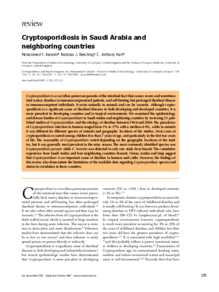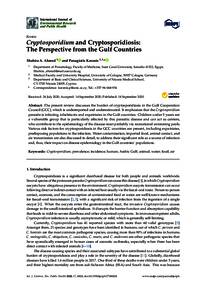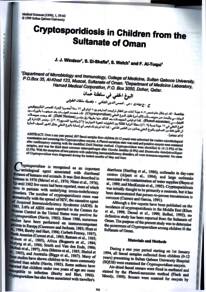Document
Cryptosporidiosis in Saudi Arabia and neighboring countries.
Identifier
DOI: 10.5144/0256-4947.2007.325
Source
Annals of Saudi Medicine. V. 27, 5, P. 325-332.
Contributors
Beeching, Nicholas J., Author
Hart, C. Anthony., Author
Country
Saudi Arabia.
City
Riyadh.
Publisher
King Faisal Specialist Hospital and Research Centre.
Gregorian
2007-09-01
Language
English
English abstract
Cryptosporidium is a coccidian protozoan parasite of the intestinal tract that causes severe and sometimes fatal watery diarrhea in immunocompromised patients, and self-limiting but prolonged diarrheal disease in immunocompetent individuals. It exists naturally in animals and can be zoonotic. Although crypto-sporidiosis is a significant cause of diarrheal diseases in both developing and developed countries, it is more prevalent in developing countries and in tropical environments. We examined the epidemiology and disease burden of Cryptosporidium in Saudi Arabia and neighboring countries by reviewing 23 published studies of Cryptosporidium and the etiology of diarrhea between 1986 and 2006. The prevalence of Cryptosporidium infection in humans ranged from 1% to 37% with a median of 4%, while in animals it was different for different species of animals and geographic locations of the studies. Most cases of cryptosporidiosis occurred among children less than 7 years of age, and particularly in the first two years of life. The seasonality of Cryptosporidium varied depending on the geographic locations of the studies, but it was generally most prevalent in the rainy season. The most commonly identified species was Cryptosporidium parvum while C. hominis was detected in only one study from Kuwait. The cumulative experience from Saudi Arabia and four neighboring countries (Kuwait, Oman, Jordan and Iraq) suggest that Cryptosporidium is an important cause of diarrhea in humans and cattle. However, the findings of this review also demonstrate the limitations of the available data regarding Cryptosporidium species and strains in circulation in these countries.
Description
Volume 27, Issue 5, Pages 325-332.
ISSN
0256-4947
Category
Journal articles



